The official name of the Iran Nuclear agreement is the Joint Comprehensive Plan of Action or JCPOA. It was signed in Vienna on 14 July 2015 between the Islamic Republic of Iran on one side and France, Great Britain, China, Germany, Russia, and the US on the other. The alliance of France, Great Britain, China, Germany, Russia, and the US is known as the “P5 +1”. “P5” refers to the five permanent members of the United Nations Security Council. The “+1” is Germany.
The agreement came after nine long years of negotiations. After seven years, there was an interim agreement in preparation for the final deal.
The interim agreement was the Joint Plan of Action (JPOA). It ran for twenty months from November 2013. During that time Iran had to meet a number of milestones in regard to its nuclear programme, which it did. As well as an interim agreement, the JPOA was a test for Iran to show that they could stick to a bargain.
On the achievement of each of the milestones in the JPOA, some of Iran’s international funds in escrow were released to them. The negotiators on both sides saw this as helping Iran get support for the agreement internally, which it did. However, for critics this was Iran being paid to stick to the deal. They thought a better test would be if Iran had no financial incentives to stick to the plan.
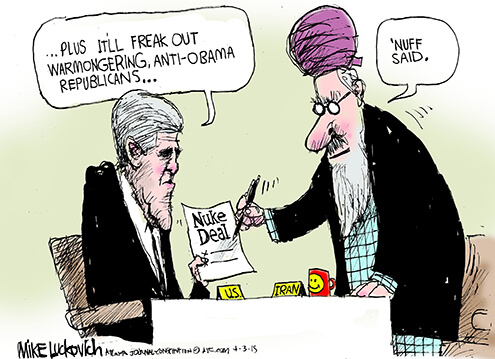 However, those critics fail to recognize that just as the US in particular doesn’t trust Iran, Iran has plenty of reasons not to trust the P5 + 1, especially the US. The US has, for example, meddled in the internal affairs of Iran a great deal in the past such as when they overthrew a popular leader and instead gave their support to the Shah. The Shah was a supporter of the US, but there were many undesirable aspects to his rule. In particular, his use of secret police and torture was widespread.
However, those critics fail to recognize that just as the US in particular doesn’t trust Iran, Iran has plenty of reasons not to trust the P5 + 1, especially the US. The US has, for example, meddled in the internal affairs of Iran a great deal in the past such as when they overthrew a popular leader and instead gave their support to the Shah. The Shah was a supporter of the US, but there were many undesirable aspects to his rule. In particular, his use of secret police and torture was widespread.
There is fault on both sides though many on the extreme right in both Iran and the US are unable to recognize this.
Iran’s Obligations under the JCPOA
There are five main requirements that Iran must meet in the Iran Nuclear agreement (JCPOA). They are:
1. Reduce their stockpile of uranium from 10,000 kgs to 300 kgs i.e. a reduction of 97%. They are not able to have more than 300 kgs of uranium, and that uranium must not be enriched to weapons grade.
2. They are only allowed to enrich uranium to a level of 3.67%. This is the level required to power a nuclear reactor. For medical research, uranium needs to be enriched to 20%. Uranium must be enriched to at least 90% to be used in a bomb.
3. Currently Iran has 20,000 centrifuges. They have to get rid of 14,000 of those and of the 6,000 remaining only 5,000 can be used for fissile material. The remaining 1,000 can only be used for research and development. In addition, the technology of centrifuges has improved since they began obtaining centrifuges. The 6,000 centrifuges they retain are those with the oldest technology.
4. Before this deal, there were NO inspections of Iranian nuclear facilities by the International Atomic Energy Agency (IAEA). They now inspect eighteen nuclear facilities as well as nine other facilities to ensure that Iran is meeting its obligations.
In return for all this, Iran got relief from the international economic sanctions that were crippling its economy, but had not stopped its nuclear programme. In fact, each time more sanctions were put on Iran, there was an increase in both centrifuges and their stockpile of uranium. This sanctions relief includes the lifting of banking restrictions that meant, among other things, Iran and Iranians couldn’t get access to funds held in overseas financial institutions.
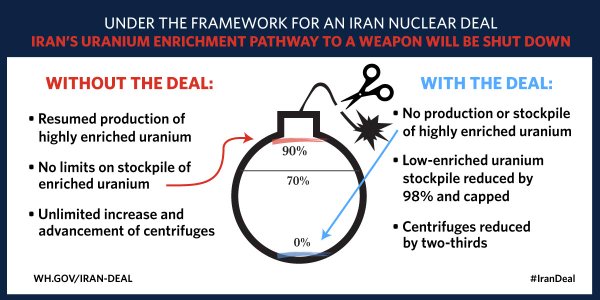
Obama Administration summary of Iran Nuclear agreement.
A Diplomatic Solution Means No War
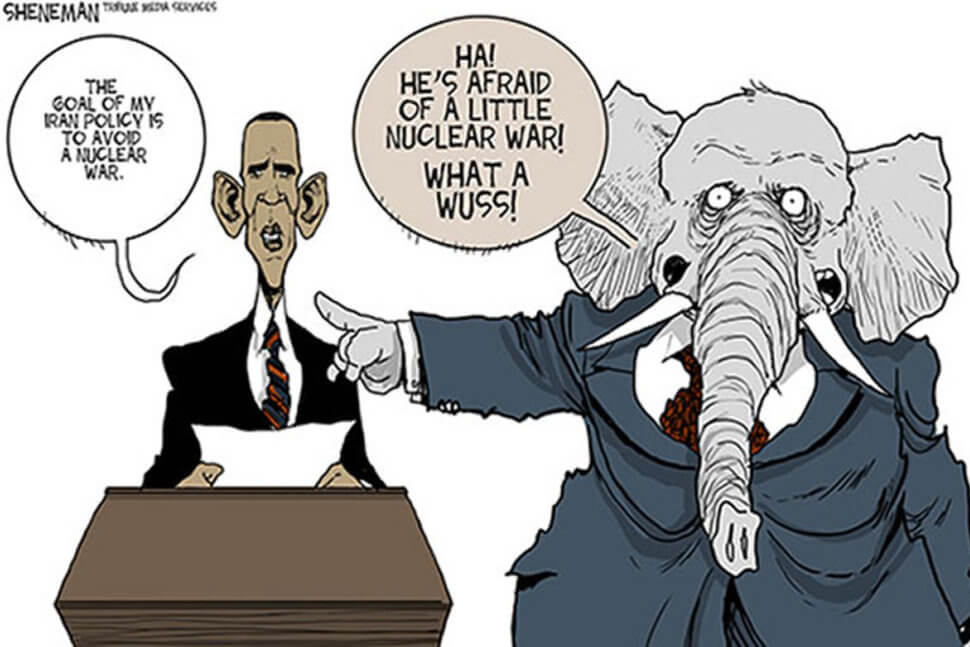 Before the signing of the Iran Nuclear agreement, the US was inching towards involvement in another war in the Middle East. That is, of course, the last thing anyone needs. To state the obvious, war is expensive. More importantly, people die or are permanently injured – both physically and psychologically.
Before the signing of the Iran Nuclear agreement, the US was inching towards involvement in another war in the Middle East. That is, of course, the last thing anyone needs. To state the obvious, war is expensive. More importantly, people die or are permanently injured – both physically and psychologically.
A war would also create new resentments against the US in the region. The US seems to have this ability to snatch failure from success when it comes to military conflict in the Middle East. It all comes down to the way they treat the victims of their wars.
After World War II, the US made an effort to help rebuild Germany and Japan. To this day, those nations are successful and allies.
However, they’ve done a pretty poor job in some more recent conflicts. Following the Iraq War, for example, their programme of de-Ba’athification was a primary driver (though certainly not the only one) of Islamist terrorism in the country and the rise of DAESH.
“Giving” Iran Money for Signing the Iran Nuclear Agreement
One of the things I hear right-wing commentators complain about the most when it comes to the Iran Nuclear agreement is all the money the US “gave” Iran as a result. The US didn’t “give” Iran any money. The money already belonged to people, the government, and businesses in Iran. What happened is the US and most other countries froze their bank accounts in accordance with international sanctions. Thus, Iran couldn’t access their own money held overseas.
And that famous planeload of cash that Trump misrepresents every chance he gets? That was actually money that Iran paid to the US in 1979 to buy military equipment. The US didn’t deliver the goods due to the coup, and they didn’t give the money back. The failure of the US to refund several billion dollars for almost forty years is not a fault on Iran’s part! Trump may think it’s okay not to refund money when you fail to provide the goods. Most of us see that it’s actually about time Iran got their money back.
Further, Iran didn’t get their money back just for signing the agreement. First, they had to meet the terms of the agreement.
“Iran Will Use the Money They Get to Fund Terrorism”
It is true that both official and unofficial sources in Iran fund terrorism. Obviously that’s wrong. But the funding of groups like Hezbollah and Hamas is a priority of the Iranian government. When the Iranian economy was on its knees due to the international economic sanctions. That did nothing to stop the funding of their favourite terrorists. It’s the same as the situation in North Korea. North Koreans are at least two inches shorter on average than South Koreans and have a much shorter life span due to poor food, but that doesn’t stop the leadership investing heavily in nuclear weapons. If something is a priority, a government will do it.
How would you feel if you had money invested in Iran, and all of a sudden you couldn’t have it just because? It is possible, even likely, that Iran will use some of the money going back there for terrorism. However, most of it will be used by ordinary Iranians. The economy of the country will grow and the middle class will develop. Ordinary Iranians are already calling for more democracy. A growth in the middle class and an increase in their wealth will see those demands increase. The majority of Iranians do not support conservative Islam, and the independence that individual wealth will give them power.
Further, it was the moderate president Hassan Rouhani that negotiated the deal, not the conservative Ayatollah. This gives the moderates in politics more political support and therefore power too.
The most likely result of a more economically secure Iran is calls for greater democracy and freedom. Most Iranians want to be part of the world, and greater wealth will give them that opportunity.
The US Congress and the Iran Nuclear Agreement
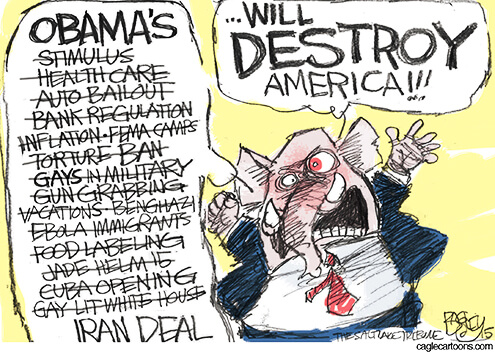 Even before they knew what was in it, the Republican controlled Congress was complaining about it. The fact that it was the Democratic President Obama who was signing it was enough for many.
Even before they knew what was in it, the Republican controlled Congress was complaining about it. The fact that it was the Democratic President Obama who was signing it was enough for many.
Other strong opposition to the deal, also before he knew what was in it, came from Prime Minister Netanyahu of Israel. As a result, several Democratic politicians also came out against the deal.
There was nothing Congress could do to stop the deal so instead they made a law that requires the president to certify whether or not Iran is in compliance every ninety days. No other country has this requirement. It’s a reactionary rule made by a petulant Congress, and it’s the reason this deal has become an issue now.
If it wasn’t for the certification requirement every ninety days, Secretary of State Tillerson could have kept President Trump distracted from the Iran Nuclear agreement. It would have been left alone to operate as it should. But the certification requirement brings the JCPOA back to Trump’s attention every three months and requires him to admit Obama got something right.
Trump Refuses to Re-Certify Iran Nuclear Agreement
Trump’s not personally capable of admitting something Obama did might be okay. It’s also difficult for him politically because his administration has so few wins on the board. Thus, as everyone knows by now, he recently refused to certify that Iran was complying with the agreement when the issue came up for the third time since he became president. This was despite the fact that Iran actually is currently complying with the terms of the Iran Nuclear agreement.
Instead he palmed the issue off onto his Congress, demanding they deal with it. In doing so he said:
In the event we are not able to reach a solution working with Congress and our allies, then the agreement will be terminated.
General Joseph Dunford, Chairman of the US Joint Chiefs of Staff, and James Mattis, US Secretary of Defense, have both come out against this decision. They have also said that they believe the Iran Nuclear agreement delays Iran getting a nuclear weapon. Secretary of State Rex Tillerson also confirms that Iran are meeting the terms of the agreement.
The problem with sending the agreement to Congress is there’s nothing they can do except confirm the deal. If they do anything else, it will be the US that broke the deal. They will be the ones in violation, and they will be the ones to give Iran an excuse to re-start their nuclear programme.
Iran probably wouldn’t actually do that. They would make another statement that they will be sticking with the agreement, this time with the other partners to the deal.
In this way Iran will have a moral victory over the US. They will be the adults in the room.
If Trump is worried about the way he looks now, it’s nothing to how he will look if and when that happens.
Why is Trump Refusing to Certify the Iran Nuclear Agreement?
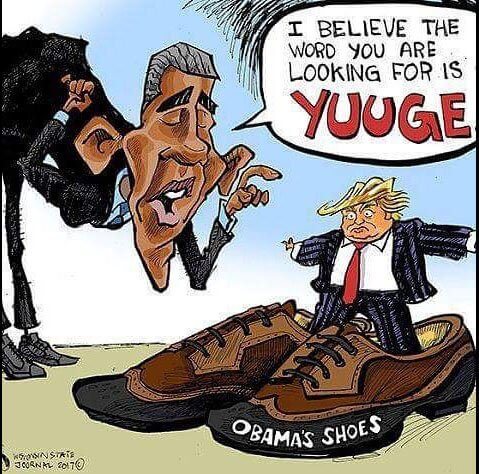 There are several reasons I think Trump is doing this.
There are several reasons I think Trump is doing this.
Firstly, I think he just wants to oppose anything President Obama did as a matter of course. He appears to take some kind of personal pleasure in dismantling anything Obama was part of creating. He seems unable to handle that so many compare his character unfavourably with Obama.
Secondly, he thinks this sort of thing makes him look tough. Bullying is not strength. Always raising to the bait is not strength.
Thirdly, he hasn’t kept many of his campaign promises. He needs to get a “win” on the board, and this is one of the things he’s chosen. The fact that it’s actually a major loss doesn’t worry him. It’s how it looks to his base that matters. Iran makes a good whipping boy: they’re Muslim, they have a history of denying the Holocaust, and they’re always threatening Israel and the US. Many still remember the US Embassy hostage crisis in Iran too.
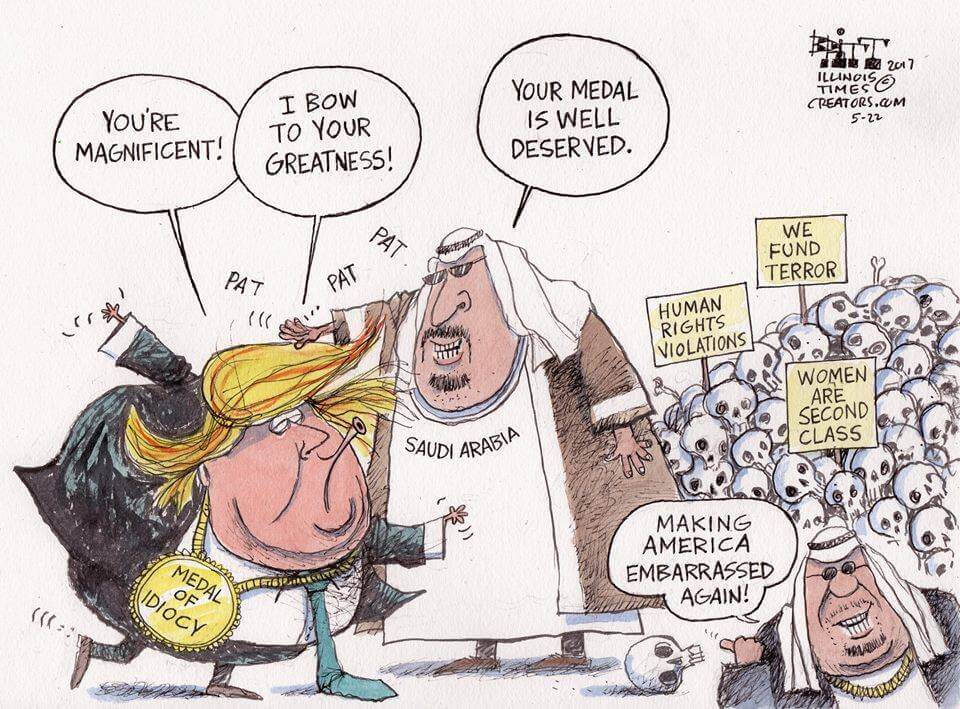 Fourthly, it does make some US allies happy. Specifically, Saudi Arabia, who are fighting proxy wars with Iran all over the Middle East and North Africa. Saudi Arabia did a really good job of sucking up to Trump and treating him as he thinks he deserves – like a king. Shi’a dominated Iran has been growing in influence in the region due to their support of Iraq against DAESH. US ally Sunni-dominated Saudi Arabia hates this.
Fourthly, it does make some US allies happy. Specifically, Saudi Arabia, who are fighting proxy wars with Iran all over the Middle East and North Africa. Saudi Arabia did a really good job of sucking up to Trump and treating him as he thinks he deserves – like a king. Shi’a dominated Iran has been growing in influence in the region due to their support of Iraq against DAESH. US ally Sunni-dominated Saudi Arabia hates this.
The Iran Nuclear Agreement is Not a Bilateral Deal
One of the more annoying things about the way Trump talks about the Iran Nuclear agreement is as if whether it stands or falls is up to him. However, it’s not up to Trump whether this agreement is terminated and he cannot decide that. He does not have that power. He cannot “rip it up”.
Whether he likes it or not, the Iran Nuclear agreement is not a bilateral agreement between the US and Iran. The other countries that were part of the negotiations are also signatories. None of the other countries want a renegotiation of this deal. Since Trump’s statement several, including Iran, have publicly reiterated their support for the agreement. Whatever the US does, the Iran Nuclear agreement will remain in place.
A joint statement from Britain, France and Germany reads:
We stand committed to the JCPOA [Iran Nuclear agreement] and its full implementation by all sides. Preserving the JCPOA is in the shared national security interest.
The British government even put out a video expressing their ongoing support for the JCPOA because of the problems Trump is causing with his failure to stick to the agreement.
President Trump is so wrong about the Iran Deal that the British government made a video debunking him pic.twitter.com/qLRqhDTkus
— NowThis (@nowthisnews) October 16, 2017
All Trump is proving is that the rest of the world can no longer rely on the US to stick to its promises.
“Iran is Not Sticking to the Spirit of the Deal”
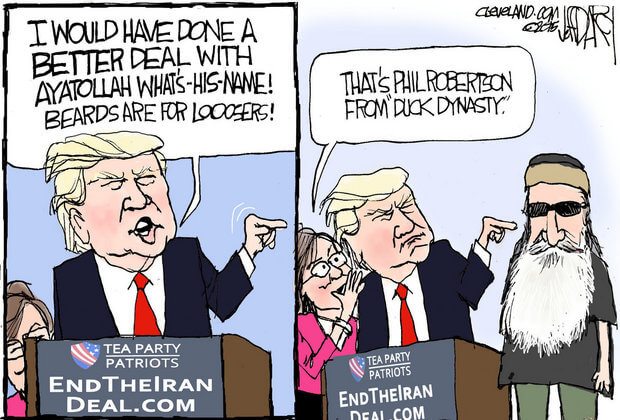 This is the excuse of opponents of the deal upon reminding them that Iran is not in violation of the JCPOA. Many, including Trump himself, have used those exact words. What they are all referring to is that Iran continues with its very large missile defence programme.
This is the excuse of opponents of the deal upon reminding them that Iran is not in violation of the JCPOA. Many, including Trump himself, have used those exact words. What they are all referring to is that Iran continues with its very large missile defence programme.
However, that is irrelevant. Of course it’s not good that Iran has a missile programme, but it’s not the point. The JCPOA is about Iran’s nuclear programme and requires them to stick to a set of conditions in relation to that. So far, they are doing that. You can’t break a contract because the other party does something you don’t like that isn’t part of the contract.
Iran is sticking to the nuclear agreement. Get over it. Saying “Iran is not sticking to the spirit of the deal” makes the US seem small and petty and they look to be making an excuse not to stick to their side of deal.
Trust and International Diplomacy
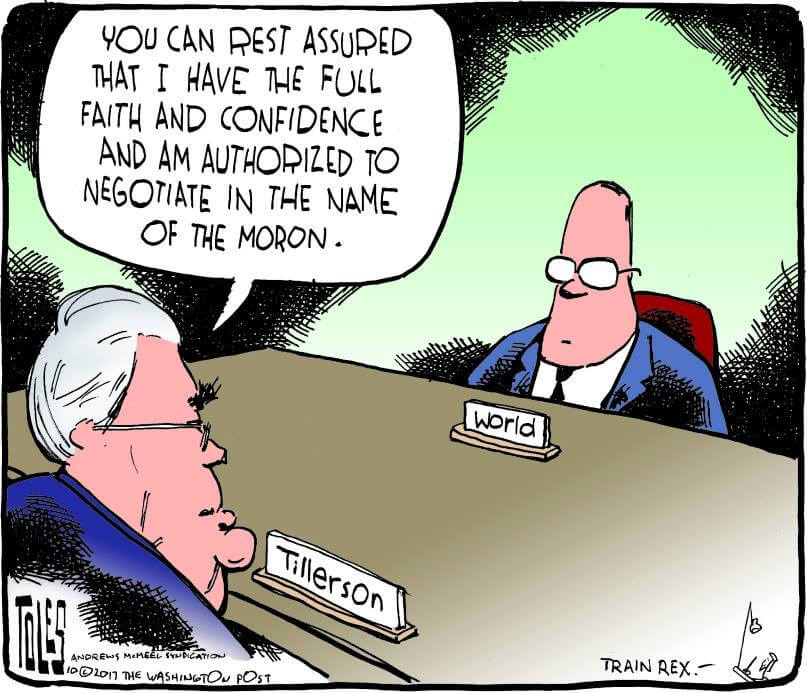 Trump is continuing to damage the reputation of the US, and not just in relation to this deal. In addition, it is extremely important that when international leaders meet with the US Secretary of State that they know he speaks for the president. Because Trump continues to undermine his Secretary of State Rex Tillerson, it is difficult for him to negotiate on behalf of the country.
Trump is continuing to damage the reputation of the US, and not just in relation to this deal. In addition, it is extremely important that when international leaders meet with the US Secretary of State that they know he speaks for the president. Because Trump continues to undermine his Secretary of State Rex Tillerson, it is difficult for him to negotiate on behalf of the country.
One of the most important things about the way international diplomacy works is trust. Ever since Trump became president there has been a problem with this. Early in his presidency there were questions about whether the US would stick to Article 5 of the NATO agreement because of Trump suggesting he would not. Tillerson said that the US would meet it’s obligations, but nobody could trust his word because of his boss’s grandstanding.
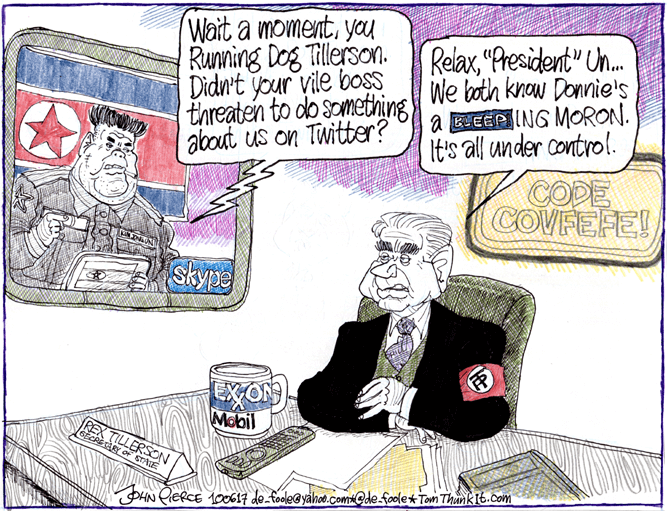 That doesn’t just affect the Iran Nuclear agreement. It is also a problem in every other situation where Rex Tillerson is speaking on behalf of the US, including in relation to North Korea. How can anyone rely on what Tillerson says when they don’t know whether he’s really speaking for the president?
That doesn’t just affect the Iran Nuclear agreement. It is also a problem in every other situation where Rex Tillerson is speaking on behalf of the US, including in relation to North Korea. How can anyone rely on what Tillerson says when they don’t know whether he’s really speaking for the president?
It goes further than that too. Trump’s failure to keep the word of the US on the international stage may become an excuse in the future for other countries not to stick to their side of a deal, and the problem may extend into future presidencies.
“The Great Dealmaker?”
The above is the start of a headline in today’s Washington Post: ‘The great dealmaker? Lawmakers find Trump to be an untrustworthy negotiator.‘ It’s about the internal issues in the US lawmakers are having trying to negotiate with President Trump. The problems are similar to those in the international realm.
Whether or not Trump was a good dealmaker in the business realm I’m not in a position to judge. I would say though that it’s a different environment. In international diplomacy, there’s a requirement for everyone to get something from a deal. Those who negotiate them have to be able to sell them back home. It’s not possible to get everything you want and that’s what critics of the Iran Nuclear agreement are failing to understand.
The deal isn’t perfect – for either side. It took nine years to get to a point where both sides had an agreement they could live with. Many will remember that it seemed to many that when President Rouhani was talking about the deal in Iran he seemed to be talking about a different deal than President Obama was in the US. That wasn’t the case. Rouhani was simply emphasizing different things in order to sell the deal at home. That’s politics.
It’s a Good Deal
Because of the Iran Nuclear agreement, the Iranian nuclear programme has been stopped in its tracks. Without that agreement, Iran would have a bomb by now. If sanctions had gone on any longer trying to get a tougher deal, the likelihood is that Iran would have had a bomb before negotiations started, Then it would be too late. The sanctions weren’t stopping the nuclear programme. This agreement has. Sure it’s not for infinity, but it would be ridiculous to expect that.
As things stand, it will be at least ten years before Iran can start work again, and who knows what will happen by then? In he meantime, if Iran secretly restarts their nuclear programme, it will be at least twelve months before they have enough enriched uranium for one bomb. And, the inspections regime means they will almost certainly get caught before that.
The world is a safer place because of the Iran Nuclear agreement.
If you enjoyed reading this, please consider donating a dollar or two to help keep the site going. Thank you.

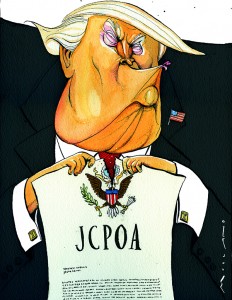
I guess an issue is that politics and business are not the same bedfellows. The principles should be the same but of course the people are different…
Good post Heather – in following your logic I agree that the Iran Nuclear Agreement helps us to get a good night’s sleep.
Thanks Martin. I think some businessmen could transfer their negotiating skills, but Trump seems to think that a requirement of a successful deal is one where the US gets everything and the other party gets screwed. If that didn’t happen in business he could walk away, but it’s obviously not how international diplomacy works. It took nine years to negotiate this deal. He thinks he can change it by snapping his fingers.
Outstanding post, Heather.
Informative and you systematically debunk the wrongheaded, bogus arguments against it. Hat’s off to you.
don’t know where that apostrophe came from….
Thanks Nicky.
You have covered this issue quite well. Better than most of the pundits I have seen on the tube and I must say, the argument against that is pronounced by our dear leader is an empty shell. He simply wants to throw all the other issues totally unrelated to this deal, in with this issue. This is retarded thinking but just consider the source. I would sum it up in short, because I have no more patience, simply look at the parties against in this matter. We have the great negotiators (Israel and their Netanyahu) who would never negotiate anything with Iran and essentially the American republican congress who do not know how to spell negotiation. Add to this mix a president of the U.S. that is so mentally unbalanced he can hardly tie his own shoes.
Thanks Randall. Israel has been saying for nearly thirty years that Iran is close to getting a nuclear missile. They still haven’t got one. In the meantime, Israel has and it’s an open secret. They’re not a signatory to international nuclear agreements etc, and thus are not subject to IAEA inspections to ensure the safety etc of their programme.
I understand why Israel would worry about Iran given the rhetoric that comes from them, but whatever you think of Iran, they’re not stupid. If they fired even one missile in the direction of Iran, it would be detected immediately. There’d be swift and much bigger retaliation from both Israel and the US ships in the region. Iran would suffer much worse. The only risk really is that now the US has an irrational Commander in Chief imo.
‘in the direction of Israel ‘, you meant?
Yes!
Look, I think Obama and the other parties to this deal did the good and only thing that could be done and they did it as much for Israel as anyone else. Certainly Israel worries about Iran, they worry almost about nothing else. But as I said, they will not negotiate in faith with Iran or frankly anyone else. They seem to have the republican party in their back pocket. However, where will the world be without this deal. No where good is my theory.
I agree. I think they were thinking of Israel when they made this deal. Israel are at a much bigger risk from Iran than the US.
Obama had made good progress at improving the US’s reputation in international diplomacy after the Bush Jr. Administration razed it. And then Trump. Trump is shameful and embarrassing. He is a child more concerned with what everyone else thinks about his dick size than anything else. I can only hope that this travesty of an administration instigates a solid change at all levels of the US government. As in the Republican Party and the fractious sub-groups that comprise it lose big. I’m not holding my breath though.
Yes. Though Bush’s damage to the US reputation is nothing like Trump is doing. Bush stuck to international agreements, treaties etc that previous administrations had made. As you know, Trump is not doing even that. He’s just pulling out even when it’s against the best interests of the US, such as the Paris Accord. Is logic seems to be, “Obama did it, therefore it’s a bad idea.” He even has such a poor understanding of international trade that he thinks a trade deficit means a deal is bad for the US.
What it looks like to me is Trump does this sort of thing simply to maintain the image he created for his supporters during his campaign. A cheap, easy and entirely normal way, for him personally, to show his supporters that he’s keeping his campaign promises to them. I think it isn’t so much that he doesn’t care about the consequences for the country more generally as that the only consequences he seems capable of caring about are how he imagines the image his followers have of him is affected.
I doubt he does these sorts of things because he really opposes or despises all that Obama has done for ideological reasons. Basically Trump hijacked the Republican Party’s base, not because he shares their values, certainly not because he shares Republican Party values, but because he thought it might be his ticket to what he thought was the ultimate fount of ego orgasms. The main tactic he used to do that was to take the main propaganda memes the Republican Party and its masters have been honing for decades to create and maintain their base, and turn the knobs up to 11.
So (oops), the Republican Party has pre-conditioned a Pavlovian response to Obama bashing in what is now Trump’s base and Trump makes use of it by ringing the bell every chance he gets.
I love that last paragraph. So true!
I shouldn’t be so rude about Trump supporters, but sometimes I just can’t help it. I’m surrounded by them!
I’ve wondered too about this hatred of Obama. I mean, objectively he has at the minimum be a reasonably good president, and less objectively the best since Rooseveldt (Teddy, that is).
Is it just racism? Somehow I have difficulty to put it at that. It is not as if he used his position to get acces to females either, so that one is out too. Is it that he’s something of a real intellectual, well educated and an accomplished thinker? Is the hatred of that really that great in the US? I cannot fathom the ‘Obama-hate’, why is it?
I don’t understand the Obama hate thing either, and that’s what makes me wonder if he really is racist. There doesn’t seem to be any logical reason for him to have this quite irrational reaction to Obama and it makes me think maybe there’s an irrational reason, like that he;s black.
It could also be that Obama is contemptuous of Trump, and Trump can’t handle that. He expects to be treated like someone special, and Obama didn’t do that. He mocked him at that correspondents dinner, and Trump appears unable to laugh at himself. He’s incredibly insecure.
Thank you for a wonderful explanation of the Iran nuclear treaty. Trump is the most destructive president we have ever had, He is busy trying to completely destroy all of Obama’s legacy from the EPA, healthcare, national monuments, and is positioning allies to help him in this endeavor. Only hope the midterm elections will remove some of his allies.
It would be good to see that happen. Unfortunately there’s a nasty underbelly who are happy to vote for Trump and other Republicans no matter what. The Democrats have to do a better job too. They can’t just be against Trump, they have to have some good policy positions that the electorate can get behind. And it can’t be Bernie’s agenda – that’s too left wing for much of the country.
The Democrats have come up with a new tactic:
https://pjmedia.com/trending/anguished-liberals-plan-scream-helplessly-sky-anniversary-trump-election/
I think the EPA was created during Mr. Nixon’s tenure, admittedly under some pressure. However, it can be said to be as much a republican legacy as a democratic one, bipartisan (as these things should be). Same can be said of ‘Obamcare’, it is an adaptation of an originally republican plan IIRC. Obama’s great achievement is that he could pass a plan (far from ideal) that was an improvement for millions.
It is just that the GOP, due to teabaggers, trumpistas and the like, has gone fully rabiatic now.
I fully understand the desire to have peace at any cost. Unfortunately, as history has shown us time and again, depending on the adversary, we can pay a very high price and have the war nevertheless.
There are many misconceptions and not really correct information in your analysis. Let’s start with #1: JCPOA is a rather strange agreement which was NOT signed by any party. It’s an oral agreement, contrary to normal praxis. Iranians said that they are going to agree without signing. They got their wish.
#2 Iran’s enriched uranium was shipped to Oman, Iran’s ally which means that it is within Iran’s reach any time.
#3 Iran got permission for deceloping state-of-the-art centrifuges as well
#4 Inspections: Even having intelligence about Iran’s violations it wouldn’t be possible to prove these violations because “inspection procedure designed by the Obama administration precludes actual inspection – at Iran’s military sites and at any other suspect site, with the exclusion of Iran’s declared nuclear sites. […] This is because under the agreement, the obtaining of such intelligence information is [far from enough]. Instead of an inspection of a site being immediately triggered when such information is obtained, the JCPOA requires a series of preliminary steps before any such inspection will be permitted – if it is permitted at all. That is, under the JCPOA, the U.S. must:
a) Hand over the intelligence information and information on its sources to Iran for the purpose of clarifying ‘concerns,’ both in discussions between the International Atomic Energy Agency (IAEA) and Iran, and in discussions with the Joint Commission of the JCPOA – which in addition to the U.S., U.K., France, Germany, and the IAEA includes Iran, Russia, and China – with the aim of clearing up the concerns via alternative ways that will not involve inspection of the site. b) If no agreement on alternative ways not involving inspection of the site can be reached, there will be an additional discussion in the Joint Commission, where decisions on this matter are to be made by majority vote within seven days. Iran must comply with the decision within three additional days.
This ridiculous inspection procedure obviously does not enable any real investigation of Iran’s continuing military nuclear activity, even when there is intelligence information about it.”
And what Iranian official say about it?
Khamenei, July 25, 2015: “[The foreigners] shouldn’t be allowed at all to penetrate into the country’s security and defensive boundaries under the pretext of supervision, and the country’s military officials are not permitted at all to allow the foreigners to cross these boundaries or stop the country’s defensive development under the pretext of supervision and inspection.”
Foreign Minister Javad Zarif, July 22, 2015: Inspections of this kind cross “the red lines” and in the [JCPOA] negotiations Iran had “succeeded in fully ensuring” that the agreement would not allow such inspections.
Khamenei’s top adviser for international affairs, Ali Akbar Velayati, July 2015 to the Arabic service of Al-Jazeera TV: “Access of inspectors from the IAEA or from any other body to Iran’s military centers is forbidden.”
More recently, IRGC Aerospace Force commander Amir Ali Hajizadeh, August 7, 2017: “In the matter of the Westerners’ request to inspect our military centers, the answer is clear. We will not allow them to do such a thing.”
In an August 22, 2017 interview on IRINN TV, Ali Akbar Salehi, head of the Atomic Energy Organization Of Iran (AEOI) and a member of Iran’s nuclear negotiating team, said: “[We] regard the maintaining of the Fordo facilities as a point of strength in the JCPOA, whereas they [the U.S. and EU3] did not even want the Fordo [facility to] exist and said we had to shut it down. [Newspaper and television] reporters are supposed to visit the various areas of this [Fordo] facility. If you have archive photos [of it], you can see how much the facility has changed and what activities are taking place, especially in the field of stable isotopes and in the various labs. We maintained Fordo in the JCPOA so that if we want, we can start enriching [uranium] to 20% within five days.”
and further:
“Certain people said that our nuclear industry has been paralyzed, and that it has been shut down and that [the West] has taken it [away from us], and even if you swear [that none of this is true], it is no use. That’s why we decided to present photos of the renewed reactor in Arak [to the public]. [The critics] presented photos of the pit that had been filled with cement and claimed that we had poured cement into the core of the Arak reactor. Those pictures are photoshopped, and [the people who presented them] must apologize and confess that they are deceiving public opinion with falsehoods.
“We [actually] poured cement only into some of the reactor’s pipelines, [pipes] several centimeters in diameter and two to three meters long. [We poured it] not into the reactor itself but [only] into the external pipes. If we are instructed to restore the former reactor and advance the former program that is unsuitable to [the present time] and is 40 or 50 years out of date, we will remove the front and back parts of these pipes and put in new pipes, which will take only several months.”
Well, I could write much more: about ubiquitous hate propaganda in Iran against U.S., Israel and the whole West; about long-range missiles which are energetically developed in Iran (some even decorated with words in Hebrew “Death to Israel”); about total unity now between “moderate” President Rouhani (who supports terrorists, hanging of opponents etc.); about drastic cuts in support for Hezbollah and Hamas during the last year before Iran got money as result of JCPOA and about Iran’s drastic increase in funding of these groups after; about Iran’s budget which shows that new money go mainly into IRGC and army; about Iran’s expansion (Iraq, Syria, Yemen) but my comment is already too long.
What you say doesn’t change anything I said. I said in the post that of course Iran is going to downplay the requirements they must meet. They emphasize certain things and don’t admit others. Netanyahu is doing the same for obvious reasons.
At the end of the day, if there is suspicious activity, Iran has to allow IAEA inspections on top on the normal inspections (which are already the most rigorous of any country) within 30 days. There’s no getting around that. Even if Iran has removed the uranium from a site in that time, it’s former presence can still be detected.
And 20% enrichment, even if they did it, does not help. They need 90% enrichment for a bomb.
Israel has nuclear bombs. It is not subject to international inspections because it has never admitted it has nukes. Iran doesn’t have nuclear bombs, and it doesn’t have a programme to develop one anymore. They are subject to the toughest inspections regime of any country in the world, which, of course, they don’t admit to their people. IAEA inspectors say they have got a 97% confidence level they could detect any breaking of the agreement. Even if Iran broke the agreement, it would take at least 12 months, during which time they would have to keep the enrichment programme hidden from inspectors on an ongoing basis, to get enough uranium enriched to 90% for one bomb.
The information I have is that Iran sent their previous stockpile to Russia, not Oman. It is subject to inspection to ensure it’s still there in its entirety, wherever it is – that was part of the agreement.
Before this agreement, Iran was close to getting a weapon. Now they are several years away. Yes, it would be better if the deal was tougher on Iran, but no one gets everything they want in this sort of deal, including Iran.
I’m not going to repeat what I said about the missile programme in the post. Whatever any of us thinks of it, it’s irrelevant. The deal is about nukes. Instead of re-litigating that, perhaps Trump and Netanyahu could try making a new deal in regards to that. Trump would do a better job of impressing us with his famed negotiating skills if he created new deals instead of just criticizing current ones.
You are right in one thing here: Iran’s enriched uranium is not in Oman – I didn’t check and it turned out that I misremembered: it’s Iran’s heavy water (which should also be removed from Iran’s territory) which is in Oman. Where exactly is 8.5 ton enriched uranium is not clear. As Stephen Mull, Obama administration’s State Department lead coordinator on Iran, Stephen Mull, said at a February 11, 2016 House Foreign Affairs Committee hearing: “It has not yet been decided where exactly Russia will put this information [sic].” But under questioning, Mull acknowledged that Washington had not verified the Iranian shipment.
As far as I know the most difficult and time consuming process is to get uranium from the stage of the s.k. “Yellow cake” to 20% enrichment. To get it from 20 to 90% goes much quicker, but I would have to check how much quicker.
Iran does not have the most rigorous inspections of any country. Just the opposite – it has inspections not seen anywhere else because of their laxity. Nowhere in the world are samples taken by locals and not by inspectors – like it was done in Parchin where inspectors were give samples and Iranians said that they were taken in Parchin. Well, maybe yes, maybe no. The information which went to the world that the reactor in Arak was out of commission and now they say that they cheated and cemented just the end parts of the pipelines.
According to many experts if one day Iran decides to get nuclear bomb – they are closer to it than they were before JCPOA. But I don’t think this discussion will lead anywhere, neither between us or between Europe, U.S. and Iran. Facts are too complicated, too hidden (deliberately) and too scary. We all want peace so maybe we will have it. And maybe not.
Wellyes, if Iran has decided to get nukes, they will get them, even with the best inspections and treaties. The greatest benefits of these kinds of deals is that -we hope- the desire to be ‘internationally accepted’ is greater than the desire for nukes. We need to reinforce that as much as we can.
The whole picture matters, Iran -well, I presume- sees the Gulf Kingdoms (Saud in the first place) as a threat. (Don’t forget they fought a devastating war against a Sunni dominated Iraq for over a decade). The present ‘treaty’ is as good as it gets.
A distancing of the US from these Gulf Kingdoms would, of course, help a lot too.
Why would we not be more friendly towards Iran? As far as things like human rights and aggression go, they do not compare unfavourable with, say, our ‘ally’ Saud (talk about a reference????). And I do not think it is Iran behind the problems with Muslim minorities in Europe or the US. And their anti-Israel rethoric appears very, well, ‘rethorical’ to this limited mind.
Maybe I’m biased because I know a few Iranians that are so obviously reasonable, kind and intelligent, they fled the ayatollahs, so they might not be representative, but still. According to them a lot of posturing is going on in Iranian politics.
Afaik, 2/3 of the process is getting it to 20%, and another 1/3 to 90%. But they’re only allowed the 3.67% stuff. The information about Iran’s inspections being the toughest of anywhere I think came from Tom Pickering, former US ambassador who was in the negotiations. I watched an IQ squared debate he was a part of. It’s long, but worth the watch if you’re interested:
https://www.youtube.com/watch?v=cd1KJnyTAU8
Humans have caused the vast majority of problems plaguing the earth and continue to cause problems without caring (so it seems in aggregate).
As the current “superior” conscious-sentient mammal on this planet, we all have to take the responsibility that if this world dies, we did it. What a sickening legacy. It seems to decay in our zombie fingertips every day…google it and you can soon fall down the Rabbit Hole. This planet is dying. Is this planet worth saving? Another simple google search proves ‘YES’. This struggle will and must go on after I’m dead. I hope it does. I never thought I’d live within a tRump Blip of reality when the worst of times are not buffeted by the best of times. Suxxx